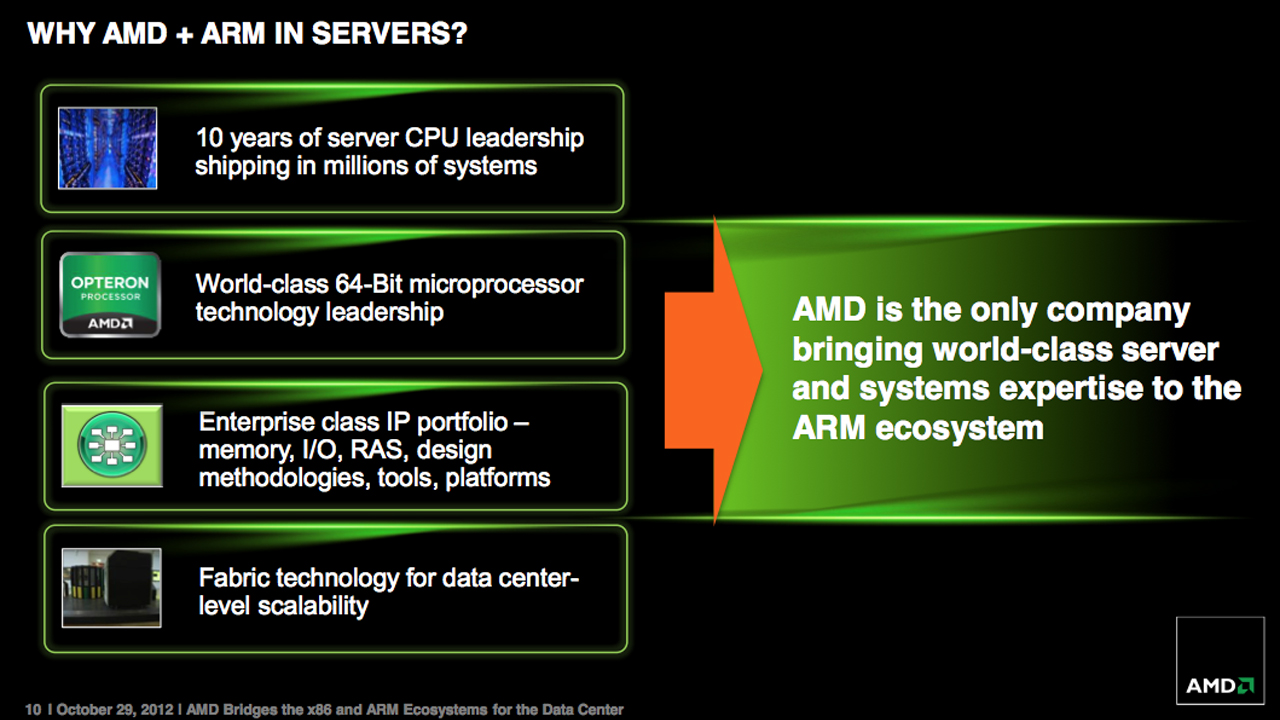Is AMD's new plan to make ARM-based processors a big deal?
AMD could strong-ARM Intel with a move away from x86

Sign up for breaking news, reviews, opinion, top tech deals, and more.
You are now subscribed
Your newsletter sign-up was successful
Given AMD's recent struggles, it's not a huge surprise. But is AMD's announcement that it intends to produce full-on server chips based on ARM rather than x86 technology a big deal?
Symbolically, it feels fairly epic. Momentum away from Intel's x86 instruction set and towards ARM processors seems inexorable. It's driven largely by the explosion in ultraportable computing, of course.
That's a market segment dominated by ARM compatible processors and one that Intel has conspicuously failed to crack. Meanwhile, Microsoft's ARM-compatible Windows RT operating system has blown apart the traditional Wintel alliance of x86 chips and Microsoft software platforms.
In that context, an announcement that the only other major maker of x86 chips is planning on making ARM chips certainly feels like a major turning point.
Low-power processors
That's especially true when you consider that AMD has its own low-power x86 core in the form of Bobcat, soon to be replaced by the upgraded Jaguar architecture.
At this stage, not a great deal is known about AMD's specific ARM-based plans. From what I understand, AMD will be taking a pre-baked ARM core off the shelf and sticking it into a processor design.
In other words, AMD isn't merely licensing the ARM instruction set and cooking up its own cores, as it effectively does with x86.
Sign up for breaking news, reviews, opinion, top tech deals, and more.
At the moment, the target market is so-called microservers where outright performance isn't critical, but node density is. Put another way, AMD's ARM is designed for where you want lots of servers, but each one has a relatively light workload.
That said, the implications could easily be a lot broader. Until recently, it was routine in the processor industry to find a single chip being sold as everything from server to desktop and laptop processor.
The implications for Intel
Once AMD has an ARM-based chip, why not put it into, say, Android tablet devices? In reality, that's a simple question with a very complicated answer.
It's more straightforward to ponder, perhaps, what the broader implications are for both AMD and Intel. For AMD, it's actually pretty hard to see how the move to ARM is going to open out huge opportunities for growth.
That's because of the sheer number of competitors making ARM-based chips. That's a major contrast to the x86 market. OK, Intel is one hell of a big beast, but at least it's the only other player in the x86 market.
In that sense, AMD's move may end up be more significant for Intel, at least in the sense of it being symptomatic of a wider move away from x86 and towards ARM.
Times, they are a changin'
Then again, things change awfully fast in the chip industry. It wasn't that long ago that Nvidia's Tegra line of ARM-based processors was into its second generation and looking like a failed experiment.
Now Tegra 3 chips are popping up in everything from Google's uber-affordable Nexus 7 tablet to Microsoft's funky Surface device. Who knows, maybe a few years from now x86 Windows 8 tablet convertibles will have decimated the market for Apple and Android tablets and Intel-powered smartphones will be on the up.
Whatever happens over the next few years, the outcome is likely to shape the industry for decades to come.
Technology and cars. Increasingly the twain shall meet. Which is handy, because Jeremy (Twitter) is addicted to both. Long-time tech journalist, former editor of iCar magazine and incumbent car guru for T3 magazine, Jeremy reckons in-car technology is about to go thermonuclear. No, not exploding cars. That would be silly. And dangerous. But rather an explosive period of unprecedented innovation. Enjoy the ride.